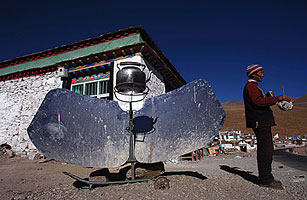
“Exchange the role of guest for that of host.” That’s one of the so-called 36 Strategies, a collection of ancient Chinese proverbs whose provenance is uncertain. The saying means that in order to gain the upper hand, you should put yourself in a position of action, not reaction, and reverse your fortunes. This aphorism once applied to infiltrating and outmaneuvering your foe during war. But Beijing can use it today to fight the world’s common enemy: global warming.
During last December’s climate-change talks in Copenhagen, China found itself on the defensive — and reacted with predictable intransigence. China, along with India, argued that the U.S. should bear responsibility for historic CO2 emissions and take the lead in reducing them. Washington in turn demanded that developing nations curb their rising emissions. The talks ended in an impasse. If this stalemate continues, another failure later this year in Cancn, Mexico, is all but certain.
China then has the potential to become the world’s biggest exporter of solar power, particularly to the countries in its neighborhood. There’s no question that much of Asia requires a new strategy to meet its escalating energy needs. For decades, energy from Pakistan to Thailand has been primarily generated by hydropower. Bhutan’s main revenue earner is not tourism but its export of hydropower, most of which is supplied to India. Laos also provides significant hydropower to Thailand and China.
The sustainability of this key energy source is threatened, however. The Tibetan Plateau provides the glacial source of all Asia’s major rivers: the Yangtze, the Mekong, the Irrawaddy and the Ganges, among others. But, as the glaciers retreat, the rivers they feed are drying up. In recent years, Nepal has faced constant power shortages due to a lack of water in its dams. Drought conditions in China’s Guizhou and Yunnan provinces and in Vietnam are tied to the Mekong’s predicament. Bangladesh is in a bad way, too, as the Brahmaputra recedes. For all these countries, solar power, radiating from China, can become an alternative, sustainable source of energy. China can be a good neighbor, help the environment, and make money — all at the same time.
At Cancn, China should unveil an adjusted stimulus package whereby funds will be channeled into building a new grid to conduct solar energy. This way, Beijing can establish a new template for green development.
China’s economic performance has dazzled the world, but it has also sparked fear about the country’s escalating might. Now China has an opportunity to use green power as a new kind of soft power. Because of its wealth and geography, only China is in a position to generate solar energy on a massive scale. The world can then break away from the blame game of history vs. responsibility for greenhouse-gas reduction — and move forward. Everyone wins: China’s western highland regions, the nation as a whole, much of nearby Asia and the global community. All Beijing has to do is change its mind-set — from being the guest to becoming the host.
Activist, political economist and author Brahm runs micro-enterprises for sustainable cultural development in Lhasa and other parts of Tibet
Read “Is China Now the Climate Change Good Guy?”
See pictures of Beijing trying to improve its air quality.
See pictures of the world’s most polluted places.